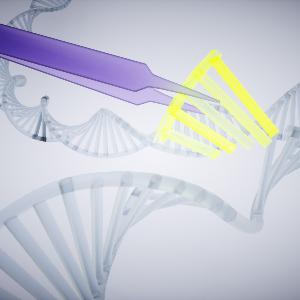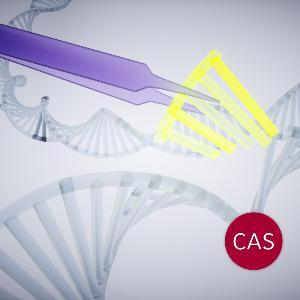
CRISPR/Cas – Chances and Challenges
CRISPR/Cas can be used to cut DNA at specific sites – a discovery that revolutionized research.
Emmanuelle Charpentier and Jennifer Doudna received the Nobel Prize for Chemistry in 2020 for their discovery in 2011 that CRISPR/Cas can be used to cut DNA at specific sites – a discovery that revolutionized research, especially in the fields of medicine and plant breeding. With this method, it is possible to make specific cuts and modifications to DNA with minimal cost and unparalleled efficiency (Genome Editing). Due to its simple handling, CRISPR/Cas-assisted gene editing is a technology that is further developing very quickly. Alongside other improvements, there are now methods for introducing CRISPR tools directly into plant or animal cells – without the detour via a corresponding gene construct. In essence: we are now in a position not only to read genomes, but also essentially to rewrite them at will.
Spokesperson
LMU Munich
Molecular Animal Breeding and Biotechnology
Visiting Fellow
University of California, San Francisco
Biochemistry and Biophysics
Working Group
- Dr. Monika Aufleger (Institut für die Didaktik der Biologie)
- Dr. Sebastian Bultmann (Humanbiologie and Bioimaging)
- Prof. Dr. Klaus Förstemann (Department für Biochemie)
- Prof. Dr. Christoph Klein (Hauner'sche Kinderklinik und Genzentrum)
- Prof. Dr. Hans-Henning Kunz (Fakultät für Biologie)
- Prof. Dr. Birgit Neuhaus (Institut für die Didaktik der Biologie)
- Prof. Dr. Dominik Paquet (Institut für Schlaganfall- und Demenzforschung (ISD))
- Dr. Silke Robatzek (Fakultät für Biologie)
- Prof. Dr. Nicolai Siegel (Experimentelle Parasitologie)
- Prof. Dr. Stefan H. Stricker (Biomedizinisches Centrum München (BMC))
- Prof. Dr. Wolfgang Wurst (Munich Center for Neurosciences – Brain & Mind (MCN) und Direktor des Institute of Developmental Genetics (IDG), Helmholz Zentrum München)
Lecture Series
-
 12 May—25 Jul
12 May—25 Jul
Further Events
- Podiumsdiskussion im Rahmen der Vortragsreihe "Cutting Edge" – "CRISPR/Cas – A New Tool or a Revolutionary Method?"
(Wintersemester 2020/21) - Vortrag von Prof. Dr. Selim Corbacioglu – "Safety and Efficacy of CRISPR/Cas9 based Gene edited Hematopoietic Stem and Progenitor Cells in Hemoglobinopathies"
(Sommersemester 2021) - Vortrag von Prof. Virginijus Šikšnys, Ph.D. – "CRISPR/Cas Immune Systems: Expanding the Genome Editing Toolbox"
(Sommersemester 2021) - Vortrag von Prof. Dr. Holger Puchta – "Applying CRISPR/Cas in Plants: From Gene Editing to Chromosome Engineering"
(Wintersemester 2021/22) - Vortrag von Prof. Dr. Matthew Porteus – "Genome Editing to Create Personalized Safe and Effective Medicines"
(Wintersemester 2021/22) - Workshop unter Leitung von Dr. Monika Aufleger mit Vorträgen von Prof. Dr. Klaus Förstemann und Dr. Dagmar Hann – "CRISPR unterrichten"
(14. März 2023) | (Wintersemester 2022/23)
